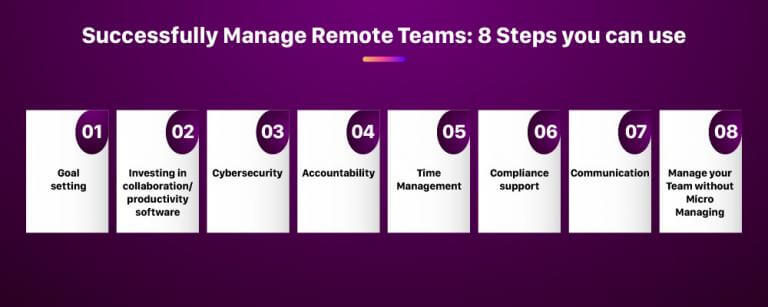A Comprehensive Guide for Remote Working

Introduction
The COVID-19 pandemic turned the traditional office world on its head. Organizations of all sizes had to pivot overnight, embracing remote work and testing new ways to stay productive. Suddenly, questions about connectivity and team dynamics became front and center. With the help of robust virtual collaboration tools and tech-savvy setups, businesses found that working from home wasn’t just a temporary fix; it was a game changer.
In fact, a KPMG study revealed that 64% of employees experienced improved work efficiency thanks to the flexibility of remote setups.
This evolution in work style didn’t stop at improved efficiency; it unlocked a global talent pool. Companies began building cross-border teams, venturing into the gig economy, and outsourcing with unprecedented ease. It’s no wonder that remote work quickly became the ace card for expanding business horizons.
What are the Best Countries for Working Remotely?

Western companies have begun establishing remote teams in a number of nations. Building remote teams and expanding your business operations internationally opens doors to new growth opportunities in the rapidly developing business markets around the world. There are more than 100 countries to choose from for global team expansion. Evaluating the pros and cons of so many options can be overwhelming. To make the choice simpler for you, we have listed the best countries considered by global business leaders such as China, the UK, and the US for expanding their remote teams internationally. The countries listed below are also the most attractive and favorable destinations in the APAC, Southern Eastern, or European markets. Here are a few examples.
India: India is a popular location for firms wishing to establish remote teams. The country boasts a vast pool of competent tech professionals and is well-known for its low labor expenses.
Philippines: Another popular destination for remote teams, notably in the customer service and contact center industries, is the Philippines. The country boasts a sizable English-speaking population as well as a favorable business climate.
Ukraine: Due to its enormous pool of highly qualified software developers and engineers, Ukraine has emerged as a preferred destination for remote IT teams.
Poland: Due to its excellent education system and burgeoning digital industry, Poland is becoming an increasingly preferred location for remote tech teams.
Mexico: Mexico is a favorite remote team located in areas such as customer service and software development. The country has a big and expanding pool of talented people, and its closeness to the US makes it an appealing alternative for American companies.
Costa Rica: Another popular destination for remote teams in the customer service and technology industries in Costa Rica. The country boasts a well-educated labor force as well as a stable political climate.
How to Choose the Country for Building Remote Teams
Setting up a remote team in a different country for international business growth is not easy. But when successful, the benefits go beyond just profitability to achieve global success. International remote team expansion helps you tap the skilled workforce into a new competitive market and strategically foster collaboration with local service providers such as an Employer of Record (EOR) or International PEO. These service providers provide the necessary guidance for remote team expansion plans in your choice of location.
As mentioned above, there are many places where you can set up your remote teams. But every business as it’s on requirements and prerequisites when you plan for team expansion. A step-by-step process that considers the time, cost, and resource constraints can help you explore potential opportunities a new market can offer. Through this article, we go beyond cultural differences, GDP growth, competition level, and communication, and focus on all the important factors to consider while choosing your destination.
Talent Availability
A strategic approach towards remote hiring might help you to expand your talent pool. India for instance offers a large pool of young, English-speaking talented professionals having a range of skills and talent. Developing an in-house HR team or collaborating with an International PEO can streamline your hiring process. It can increase your access to talent in the desired location and handle all the complexities around hiring.
Cost-Effectiveness
When considering business expansion in a foreign country, it is crucial to assess operating costs, employee and corporate taxation, production costs, government incentives, and overhead social costs impacting remote operations. Prioritizing a destination based on operational costs, prospective profitability and return on investment (ROI) can give a realistic image of the costs while building remote teams in an international location.
Favorable Business Environment
Growth opportunities in the world are vast. Assessing the economic and political environment of a country can help you choose a destination for your remote expansion plans. A destination with a stable economy and business environment encourages business growth, and market reach, and poses little political risk. Understanding the country’s GDP, CPI, and exchange rates, market size and performance, business accessibility, and general regulatory changes can help you shortlist the most viable business destination for your remote teams.
Time Zone Difference
The time zone difference of the parent location from the destination you choose should be considered as it has a significant impact on remote communication, connectivity, and operational efficiency. Having collaborative working hours and fewer time zone differences allows smoother coordination and virtual communication. Having overlapping working hours reduces the response time and increases operation efficiency between the employer and remote teams in an international location.
Cultural Familiarity
Hiring remote employees from a global talent pool allows companies to expand their roots worldwide. Remote teams weave a digital tapestry of collaboration but can encounter unique differences. These differences can significantly impact companies’ overall performance, productivity, and decision-making.
Having cultural familiarity with the location of your choice for team expansion can reduce the language barriers and differences among remote employees. Being respectful in all cultural aspects is necessary for organizations, and an open-minded work culture creates that willingness. Thus, understanding cultural diversities can substantially help your business to hire qualified talent and manage remote teams effectively.
How Remote Workforce Can Benefit Your Business
Developing a Productive and Flexible Work Culture
When the employees are not tied up in the office working, they get the flexibility to structure their working hours and schedule. Employees achieve a better work-life balance and reduced burnout leading to increased job satisfaction. As per a study by the Society for Human Resource Management (SHRM), companies with flexible work arrangements observed a 17% increase in productivity. You can devise a working schedule that works best for both employers and employees thereby enhancing productivity and performance while working remotely.
Fostering Innovation and Growth
Fostering innovation inside a business is a driving factor behind long-term growth and success. A remote working culture encourages cross-functional collaboration. It enhances experimentation and connectivity within virtual teams and inculcates the trend to research and develop new remote techniques of working. Employees are not in the mundane in-office working model that allows them to tap into unique perspectives and consider opportunities in a remote world. Companies can foster this way of working for employees by recognizing and rewarding new ideas. It motivates employees to remain ahead in today’s fast-changing remote working market.
Employee Retention
Finding and retaining talent is not easy. Benefits like better work-life balance, zero commutes, flexible work schedule, and enhanced employee engagement maximize employee satisfaction in your organization. It motivates employees to be associated with your organization for longer periods thereby reducing the attrition rate of your company. Working with remote teams help businesses save on the costs associated with recruiting and training new employees.
Location Independent (Linking to EOR/PEO in India)
By embracing remote working with an Employer of Record (EOR) or Professional Employer Organization (PEO) services, you can work towards remote team expansion and tap into the global talent and workforce. Partnering with an EOR/PEO relieves you of your administrative duties allowing you to focus on the core business operations. Having a local guide like an International PEO, helps you explore a new marketplace and gives you a competitive edge in the ever-evolving remote marketplace.
How Do Businesses Benefit from Remote Working Teams?
The Covid-19 pandemic gave everyone a taste of what work-from-home truly feels like. It took the stress off the plate of many employees and employers around the world. Remote working is a popular working model for companies planning to expand their operations in foreign countries. Working with remote teams is not a new concept and has been practiced in the past by many companies worldwide. It has evolved over the years through various business models.
For instance, if we look at the evolution of business models used to expand businesses, outsourcing, and freelancing have used working remotely to a great extent. The majority of the IT, telecommunication, and marketing industries have used this model to expand their businesses globally.
Building remote teams and expanding your business operations internationally opens doors to new growth opportunities in the rapidly developing business markets around the world. With remote team expansion, you can test your services in a new or unsaturated market, and expand your brand identity. It helps employers save costs around infrastructure and logistics while providing employees an opportunity to develop a better work-life balance.
Remote teams help small and medium-sized businesses to build a more diverse, equitable remote workforce. Any SME or startup can recruit top talent, and build a diverse workforce of skilled professionals. The remote teams, at cross-border locations, function towards achieving company objectives and goals. This reduces the risk of relying on a single market for profitability.
IBM, the multinational technology company, was one of the first top major corporations to experiment with the remote working model. Gradually it led other companies to hire and build remote teams cost-effectively. We, as an Employer of Record/International PEO, ensure your company is backed up with a skilled remote team. Our team of HR professionals spare no effort in hand-picking the right talent from the corners of the country to groom your remote team. We support teams in every possible way by extending IT, logistical, and infrastructure support. That is the Remunance way of helping you manage your remote teams.
Any function, or service of your company or industry that you feel should be outsourced, can be done using a remote team. While working in remote teams has its challenges and may not be suitable for all types of businesses or job roles, certain business functions are well-suited for remote work due to their nature and requirements. Through this eBook, we help you explore various business functions that can be effectively performed remotely, highlighting the benefits and challenges of working remotely in each function.
Information Technology and ITES
IT and ITES services have been spearheading the remote working model for decades. The professionals in this field often require only a computer, internet connection, and specialized software tools to perform their job duties, making it feasible for them to work remotely. They can collaborate with team members using online communication tools, participate in virtual meetings, and access servers and databases remotely. To make business status tracking, team communication, and interactions easy, and to avoid any challenges during remote working, numerous new software and applications were developed by ITES.
Benefits:
- Access to a global talent pool.
- Increased productivity due to reduced distractions and commuting time.
- Flexibility in work hours, enabling employees to work at their most productive times.
Challenges for IT and software professionals:
- Difficulty in team collaboration and communication, which may require efficient online tools and processes.
- Potential security concerns related to remote access to sensitive data and systems.
- Maintaining work-life balance due to the blurred boundaries between work and personal life.
Engineering and Design
As the book by Stephen Bayley and Terence Conran rightly says, “Design is intelligence made visible”. Nothing concrete can be built without a detailed outline or design. Remote designing services have proved to be extremely important for accessing qualitative work in shorter timespans. The large, interdisciplinary, and advanced Systems-of-Systems (SoS) can be developed due to the evolving Model-Based Systems Engineering (MBSE) approach.
In fact, such an approach has helped in the emergence of remote engineering design teams. These teams comprising skilled and talented professionals, help you develop designs for any engineering focus. These include mechanical, civil, architectural, aerospace, nuclear, and many more. Remote engineering teams can collaborate on projects using a variety of tools and software, such as project management software, collaboration software, and design software. This allows for real-time collaboration and ensures that everyone is on the same page.
Benefits:
- Many engineering projects require flexibility in working hours and environment. Remote work allows employees to access software tools and create designs at their most productive times, which can lead to increased productivity and faster project completion times.
Challenges:
- Engineering projects often involve close collaboration with clients and remote work can make it more difficult to develop a strong working relationship with clients. Companies need to take extra steps to ensure that remote employees are able to effectively communicate and collaborate with clients.
- Engineering projects typically often require a high level of precision and attention to detail. Working remotely can make it more difficult to maintain quality control standards and may lead to errors or mistakes that could potentially impact the success of a project.
HR
Finding the right employees remotely despite the geographical barriers and retaining employees virtually is at times challenging for human resources professionals. HR services or HR teams have opportunities for improving internal communications rather than just providing employees with company information. Increasing the use of collaborative tools and cloud-based HR software helps in smooth business continuity in any organization.
In addition, the deployment of advanced software such as the Applicant tracking system (ATS), payroll system, and leave and attendance tracking systems ensure precise and effective payroll solutions. The adoption of in-built surveys and employee engagement tools also provides room for improvement and growth and helps employees stay content within the company virtually. Recruiters can conduct virtual interviews, review resumes and applications online, and manage the recruitment process using specialized recruitment software.
What are the benefits and challenges of working remotely for HR and Recruitment?
- Flexibility in scheduling, as HR and recruitment professionals can manage their tasks and responsibilities based on their availability and the needs of the business.
- Opportunity to leverage technology, as HR and recruitment software and tools can streamline processes and improve productivity.
Challenges of remote working for HR and Recruitment:
- Need for maintaining data security and confidentiality, as HR and recruitment functions involve handling sensitive employee information.
- Difficulty in building relationships and trust with employees and managers, as it may limit in-person interactions and socializing.
- Ensuring compliance with HR policies and procedures, as remote work may require extra effort to monitor and enforce HR policies and procedures effectively.
Accounting and Finance
Banking and financial services have embraced digitization, improved customer experience, and hence streamlined banking services even during the new normal. The development of UPI and other payment gateways (GooglePay, Paypal) has increased the adaptability of digital payment into various sectors such as retail, e-commerce, wellness, insurance, and saving schemes.
In these services, almost all the accounting functions can be carried out remotely. The functions involved in accounting and finance such as managing financial records, preparing financial statements, analyzing financial data, taxing, auditing, bookkeeping, budgeting, forecasting, or even maintaining investor relationships, everything can be carried out through remote working.
In addition, there are opportunities to develop remote working systems in areas such as Financial Planning and Analysis (FP&A) which at times require in-person collaboration. With proper training for banking officials and advanced data protection strategies, financial services can definitely thrive and succeed through remote working.
Benefits for Accounting and Finance:
- Access to specialized accounting software and tools, as remote work allows businesses to leverage cloud-based accounting software and tools that are updated in real-time.
- Opportunity for enhanced data security, as cloud-based accounting software often provides robust security measures to protect financial data.
Challenges of remote working for Accounting and Finance
- Dependence on reliable Internet connectivity: can be a challenge, especially in remote or rural areas where Internet access may be limited or unreliable.
- Maintaining data security and confidentiality: remote work may raise concerns about data breaches or unauthorized access to financial information. Businesses need to implement robust security measures, such as encrypted communication channels, secure file-sharing protocols, and strict access controls, to protect financial data.
- Compliance with regulations and standards: Ensure compliance with tax laws, financial reporting standards, and industry-specific regulations, as remote accountants and financial analysts may not have direct oversight and may face challenges in accessing necessary information or coordinating with other team members.
How Do You Build an Effective Remote Team?
When building an effective remote team in the desired location, the following few pointers can prove to be helpful
Hire the Right Team
To give yourself the best chance of hiring the right person, analyze your company’s staffing needs. Make clear your objectives and goals as to why you need to hire remote employees. Before you begin your recruitment process, try to identify early on what new positions are open or new talent that you will be needing. Understand how you will conduct the hiring process in the geographical location you have chosen for remote team expansion. Job portals can also be used to find applicants. A careful screening process needs to be created as there are many individuals seeking remote positions in general rather than interests in specific positions. However, with right connections, screening, and precise JDs can help you find your gold candidates for remote team expansion.
Hiring remote employees can still be challenging for many companies, especially when hiring candidates overseas. It can be tedious and time-consuming to figure out how to arrange or conduct several activities ranging from job descriptions (JD) to salary negotiations. If you’re looking to hire remote workers in India, you can take assistance from international PEO/EOR. They are well-versed companies in legal, accounting, payroll, and HR administration besides having extensive knowledge, networks, and skills in hiring highly talented Indian remote candidates. EOR ensures that your remote hiring is 100% compliant with Indian labor laws and employment regulations. If you already have pinned down your location to build remote teams, then go through our curated tips for hiring employees remotely. These tips can help you ace remote hiring in India.
Providing the Right Setup
In today’s flexible work environment, providing the right setup to remote working staff is critical. A well-equipped remote workplace provides employees with precise remote working tools, technology, and ergonomic assistance. A stable internet connection and hardware like laptops or PCs are essential for smooth remote functioning. By providing the necessary setup, companies display their commitment to employee well-being, which enhances the job satisfaction of employees. In addition, a well-supported remote work environment has an overall effect on productivity and allows employees to work efficiently regardless of their location.
Employee Engagement Sessions
These are important for any organization to enhance connection in the remote working environment. Team members communicate, collaborate and celebrate through virtual events, increasing teamwork and connectivity among the employees. Remote team-building activities to skill-building seminars and brainstorming sessions, can be conducted by companies to increase productivity and creativity and reduce exhaustion, and stress among remote working employees. When managing remote teams effectively, planning and conducting employee engagement sessions help to succeed in their deliverables and be dedicated to the organization’s goals and objectives.
Successfully Manage Remote Teams: 8 Steps You Can Use
A collaborative and productive remote work environment is possible through an effective remote work strategy. It is an excellent solution for building and managing remote teams. Hence, planning, executing, and evaluating a remote strategy carefully is essential. Follow the following steps to manage your remote team effectively.

Goal Setting
Setting clear expectations in your remote work strategy is extremely important for the offshore team to ensure everyone is on the same page. This includes setting service goals, deadlines, defining responsibilities, and establishing communication protocols. A framework of goals and business performance objectives to be accomplished needs to be conveyed to the remote teams. The team members can align their KPIs and team goals accordingly and can contribute to the growth of your business.
Investing in Collaboration/ Productivity Software
Today, remote work as a popular work method attracts significant attention among businesses of all sizes. This working method and developing a remote work strategy has become a norm that many companies have to adapt to fit into the new business environments of the “new normal” world. Virtual tools developers and software developers became the wizards of their companies to boost business operations in the remote setup. Mostly every company has its own dedicated IT team to rely on in times of such emergencies but using collaboration tools and platforms lays the foundation for generating smooth virtual communication amongst remote teams.
Let us understand the relevance of a few collaboration tools and platforms to achieve productivity, employee engagement, and information security amongst remote teams.
- Video Conferencing and Communication Tools:
When it comes to communication, the latest method of communication is video conferencing. The tools such as Google Meet, Zoom, and Microsoft Teams are the most preferred tools used by companies.
Google Meet has popularly grown in the last few months as it is very convenient to jump onto a google meet through a uniquely generated URL via a Gmail account. Google Meet enhances communication through its features like a whiteboard and comments section. The other preferred video conferencing tool is Microsoft Teams. Anybody with a corporate or consumer email address can sign up for Microsoft Teams 365 commercial subscription and have free access to the same.
Zoom has an exciting feature of viewing a gallery version of all the joined members. Zoom has over 90k on Google Play and 300k reviews on the App Store showcasing its popularity among other tools.
- Data and document creation
The Google Suite consisting of Docs and sheets on Google Drive is a great collaborative platform for working in sync and storing data. With 15 GB of free cloud storage, customizable sharing settings, control access to shared files, and an option for working on spreadsheets offline. The drive is great for storing documents. IT professionals always recommend saving data on Google Drive instead of the local hard drives.
Zoho is great for keeping track of data. It allows merging documents via form submissions in personalized template formats, conditional merging, and sending out interview letters, payslips, and signature collections.
- Monitoring and Maintenance Tools
Because collaboration tools and online collaboration platforms are used for remote teams, it becomes imperative for companies and organizations to monitor their remote employees. Monitoring tools are a great way to keep track of the employee’s work completion, and time spent completing assigned tasks. Some tools offer features like time tracking, attendance, employee locations, movements, and progress reports. Time management sheets, activity logs, and timesheets can be used to monitor work done by employees on certain tasks for the day.
Since the working remotely model is of a risk management nature, some companies prefer monitoring the operations for security reasons. To check the credentials of the employees, it is ideal for conducting a two-step verification by generating login detail verification through a mobile-generated code. The multi-factor verification authenticator code is a great way to maintain confidentiality. Zoho is a great web-based business tool to store employees’ personal data and professional data.
The other upside of using monitoring tools is that it helps you track the productivity of the employees. Interesting research suggested most employees showcased certain durations of the day as their most productive hours.
- Administrative and Security Tools
The dynamics of evaluating every employee’s work changed the paradigm of managers’ evaluation processes as well post-2020. They could no longer monitor the employees’ desk time by keeping an eye on them in the office but had to rely on tools to get an understanding of it virtually.
With remote monitoring technological advancements, you can view employees’ active and idle time spent on websites as well. Some tools can also click pictures of employees when they are seated in front of their laptop screens. Some tools can also help in generating accurate bills for the meetings conducted with clients. It records the accurate time a representative spends with a client as well.
However, in order to respect the privacy of the employees, it is best to inform them they are under surveillance to avoidance of legal issues. This is considered a good management practice. A June study by Gartner suggests that 26% of HRs used monitoring tools to track their employees after the coronavirus hit in 2020. Hubstaff, ActivTrak, and Teramind are known to offer technologies to monitor employees.
Cybersecurity
Cybersecurity is a critical aspect of managing remote teams, as remote workers may access company resources from outside the company network, which can increase the risk of data breaches and cyber-attacks. Establishing a clear cybersecurity policy that outlines the company’s security protocols, guidelines, and expectations is imperative. The use of virtual private network (VPN) software, two-factor authentication (2FA), and using antivirus software and firewalls can protect against unauthorized access, malware, and other cyber threats.
Accountability
Building trust and accountability is essential while managing remote employees successfully. It is crucial to make remote employees feel trusted and responsible for their work. Encouraging team members to collaborate in virtual team building can enhance shared knowledge and foster a sense of teamwork. Recognition and rewards for achievements of remote employees inculcate a positive and motivating work culture in your teams.
Time Management
It is critical when managing remote employees and teams, as team members may have different working hours or time zones. It is essential to ensure that team members are managing their time effectively to avoid burnout or missed deadlines. Employers can encourage remote team members to establish a routine and stick to regular working hours and establish clear deadlines. In addition, encouraging your remote team to take breaks and avoid working overtime to avoid burnout can help in developing a positive remote work culture.
Compliance Support
Remote work can be complicated from a legal and compliance perspective. When managing international remote teams, it is important to consider compliance with local laws and regulations. Different countries have different laws and regulations, and failure to comply with them can result in legal and financial consequences. Providing team members with guidance on compliance requirements such as tax, social security, and employment laws can be helpful. Working with legal and HR professionals such as an Employer of Record (EOR) proves to be the most optimal choice to ensure compliance with local laws and regulations. An Employer of Record is thoroughly aware of all the compliance risks and can successfully manage them on behalf of the client
Communication
Frequent communication with remote teams enhances engagement connectivity and bonding and helps build trusted relationships with the team. Communicating working routines provides regular updates and helps to keep everyone on the same page. Unlike in-person teams, globally distributed teams do not have the luxury of having face-to-face conversations. Therefore, it is essential to establish clear communication channels and set expectations from the beginning.
Use video conferencing tools to conduct regular team meetings, one-on-one meetings, and check-ins. Utilize instant messaging platforms such as Slack or Microsoft Teams to facilitate real-time communication among team members. Create a communication plan that outlines the preferred communication channels, response time expectations, and communication protocols. Encourage team members to regularly share their work progress, challenges, and feedback.
Manage Your Team Without Micromanaging
With companies paying attention to flexibility, skilled professionals and employees are turning to remote working more than ever. Remote work has made it easy to access a larger talent pool and enhance productivity. But when employees feel like being monitored constantly, it leads to discouragement. When constantly under the microscope, employees lose their concentration, thereby impeding their work abilities in certain situations.
Micromanaging and constant monitoring shorten the professional growth of remote employees. It can lead to poor performance and delivery and affect the overall remote operational efficiency of your teams overseas. A healthy remote working environment, where employees can set their schedules and work accordingly is preferred for any remote working employee. Such flexibility and freedom, encourage employees to be self-starters and enhance their working capabilities and maximize team productivity.
What Challenges Do Remote Workers Face?
Building remote teams in another country comes with certain challenges. Businesses must be aware of such challenges and plan accordingly to address such challenges for managing remote employees and teams effectively in a different country. Remote working can be challenging for both employers and employees. From an employee’s point of view, overtime work, blurred lines between work and personal life, mental health concerns, and career growth concerns are some major concerns. From employers’ perspectives, the challenges faced by remote working teams can be in terms of operational, logistics, and transactional aspects.
The challenges remote teams face in India can be different in other countries. For instance, you need to address the cultural differences and understand the Indian culture if you plan to build a team in India. Here, we will be looking at the challenges overseas businesses can face when they build and manage remote teams in India.
Building Trust
Building trust in virtual working environments can be difficult without proper coordination and collective will. The lack of visibility in employees’ work and performance may cause trust issues. Moreover, remote employees may feel aloof and discouraged if managers fail to connect regularly and build personal relationships.
Cultural Gap and Language Barrier
Cultural gap can be a major barrier when managing a remote team in India. The country has a unique culture, manifested largely in the existence of multiple languages, traditions, religions, and festivals. Such diversity in Indian culture has a wide impact on work culture such as the way of communication, coordination, and team approach is taken place. The notion of hierarchy and authority in the workplace may differ due to cultural differences.
Though India has a large size of English-speaking population, the way they speak and write English for business communication can be different, compared to native speakers. The difference in writing and speaking native languages may challenge communication and collaboration. Remote workers may require training and support to make them fluent in English and overcome language barriers.
Regulatory Compliance
India has complex and unique legal employment regulations and taxation systems. Understanding the regulatory compliance toward employing Indian talents can be tedious and painful for overseas businesses. In case of non-compliance with local laws, businesses face the risks of legal liabilities and monetary penalties. The most important aspect of running a remote team in India is avoiding regulatory issues.
Communication
Effective communication and coordination are necessary for remote teams. Time synchronization for team collaboration and scheduling meetings is a big challenge in remote working due to time-zone differences. For instance, the time-zone differences between India and most of the Western European countries are 4 to 5.5 hours and 9.30 to 10 hours in the case of India and the US or Canada. Depending on virtual connections, delays in response times and the non-availability of team members are some key challenges that hamper clear communication and coordination.
Team Engagement
Employee engagement remains a core aspect to help manage a remote team effectively. Remote employees are easily disengaged and disconnected without the source of motivation from managers. The lack of engagement and motivation often leads to several mental health issues among remote teams. As per a 2021 survey by the Royal Society for Public Health UK, the absence of coworkers leaves remote working employees feeling lonely, isolated, and inactive.
Productivity & Training
Monitoring and maintaining the productivity of a remote team can be another major challenge. Employees can feel the need for training and upgrading skills. Engaging in regular virtual communication, providing feedback, and motivating employees with clear goals and expectations can be daunting tasks.
Cross-border Payment
Transferring salaries for remote employees in a different country can be complex and time-consuming. Cross-border payments attract several charges like transfer fees, currency conversion fees, remittance charges, and international credit card charges.
Thanks to advancements in science, technology, and the global economy, companies can expand their operations in various locations by building remote teams. Any business can run its operations and services remotely, thereby boosting productivity and growth. But an employer cannot directly walk up to the employee, or there are differences in work timings when working with remote teams overseas. Hence, managing remote employees outside your organization requires a specialized equipped team.
A team that has local expertise for hiring and managing, at the same time, can guide the remote teams toward achieving company goals and overall organizational productivity. This is where outsourcing human resources to an International PEO comes into the picture. A PEO company streamlines your business which is especially important for startups and SMEs who wish to test their services outside their country. So, if your vision is to grow your business overseas, consider remote workforce management with international PEO services.
Spotlight on India in the Outsourcing World
India represents a crucial workforce in running the global economy as many multinational corporations (MNCs) rely on a large portion of Indian talent pools. With the increasing concerns of a looming recession in major economies in the West, especially Europe, many business analysts see India as a hope for leading the future global economy. According to a Remote.co survey, the top three nations for remote work in 2020 will be India, the Philippines, and Ukraine, followed by the United States, Canada, and the United Kingdom.
For various reasons, including its enormous pool of qualified IT professionals and relatively inexpensive labor costs, India is a popular destination for firms wishing to develop remote teams. Here are some facts that back this theory.
Availability of Skilled Tech Workers
Nearly 1.5 million technical students graduate from engineering colleges annually in India. However, only about 3% of engineering graduates could get high-quality tech jobs in India. According to the India Skills Report 2021, 46.82% of students pursuing a Bachelor of Technology (B.Tech.) and Bachelor of Engineering (B.E.) were found to be the most employable. Similarly, the employability of MBA students in India was 46.59%.
Academic Institutions
As of January 2023, India has many world-class institutions, and among them, 166 academies are recognized as Institutes of National Importance (INI). The INI plays a pivotal role in producing skilled professionals across fields such as science & medicine, research, design, architecture, and other specialized areas. The country has many premier institutions including 23 Indian Institute of Technology (IIT), 20 Indian Institute of Management (IIM), and 20 All India Institute of Medical Science. Also, India has 33 National Skill Development Institutes and other specialized institutes to develop vocational and industry-oriented skills among workers.
English-speaking Population
As per several reports, India has the highest number of universities worldwide, followed by the US. With the increasing number of universities, the former country has more than 265 million English-speaking population in 2022, as per the World Population Review. India has the largest number of English speakers among the countries considering English as a second language. The number of English-speaking Indians is projected to quadruple in the next decade.
Youth Population
India has a large and dynamic young population, which is one of the reasons why the country’s economy is considered bullish in the coming years. More than 65% of the Indian population is under 35 years old and with an average age of below 29. India has around 254 million in the 15-24 year age group and nearly 600 million in the 18-35 age group. Compared to India, China is facing a shrinking youth workforce. As analyzed by Business Standard, around 18% of the Chinese population represents the age of 10-24 year group while India has nearly 26% in the same category.
Future workforce
As per the analysis of EY India, India has a relatively high young population with a median age of 28.4 years, which shows the competitive advantages of the global workforce in the future. The service consulting firm further states that India is likely to produce an increment of around 24.3% global workforce in the coming decades. By 2030, the country will have a nearly 1.04 billion working population.
How to Build Remote Teams in India?
The remote working model is primarily used for building remote teams that allow work flexibility, work-life balance, and high productivity. There are various methods available for building your remote team. To name a few, building remote teams can use the options of contractors, outsourcing, freelancing, building subsidiaries in a particular country, and international professional employer organizations (International PEO). Here we discuss the top models commonly used in building remote teams. They are remote contracting, outsourcing, and international PEO services. Each model works in different ways and has different types of benefits for businesses. Following are the best business models for building remote teams and their scope in India
Outsourcing
Outsourcing your business or non-core business activities allows an organization to accomplish the same task that might have been performed in-house but at lower costs. The service providers mostly have extensive topic expertise and train a team of qualified applicants for the specific service. Businesses gain more time to focus on essential company operations by outsourcing some of their least vital business services. Outsourcing is a preferable option if you want an experienced and ready-made workforce for your remote operations without any employee engagement and other employee-related responsibilities. Outsourcing in India is a good option if you want a team of experienced professionals. Also, the outsourcing company will take care of the team selection for the assigned tasks.
Contracting
If you are looking for flexible remote hiring and subject matter expertise in your work projects, consider contractors and freelancers. They provide expertise in specific domains and services for limited or extended periods of time. Freelancers also known as independent contractors are not full-time employees. This allows overseas companies to reduce overhead costs and procure a skilled workforce without offering any additional employee benefits. This enhances the overall productivity and efficiency of your remote operations. However, the attrition rate of contractors is normally very high due to the lack of job satisfaction, security, and other employee benefits.
Subsidiary Formation
Subsidiary formation allows you to widen your market presence, build remote teams and comply with regulations. By building a subsidiary, companies can tap into local talent pools and form a legal entity that functions independently but is owned and managed by the parent firm. Subsidiary formation can provide stability, larger customer engagement, and the development of stronger relationships with clients.
By establishing subsidiaries, remote teams extend their market reach, diversify their workforce, and embrace global talent while maintaining central coherence with the parent company. However, navigating the legal and regulatory requirements, coordinating with the parent company, and adapting to the new marketplace can be challenging when establishing an entity in a new location.
PEO/EOR
International PEO/Global PEO, also known as an employer of record (EOR) is a booming new model offering a range of non-core business services. An EOR acts as a legal employer for your remote employees in the destination of your choice. As EORs have extensive knowledge of local labor laws and regulations, companies do not have to worry about the risks of legal liabilities and penalties. Using the expertise of an International PEO, companies can easily access a pool of skilled talent and hire remote employees internationally.
By adopting the International PEO model, a company can save time and resources, allowing decision-makers to focus on core business functions of remote team expansion. PEO/EOR model is your best-suited option if you are looking for building a full-time functional remote team in India without establishing a legal entity.
The Cost Insights When Running a Remote Business
Without any doubt, building remote teams in India provides you with two advantages— the availability of skilled resources and affordable rates of the workforce. This means you get access to a large pool of talent at reduced costs by hiring remote employees in India. The overall cost differs from one model to another and varies significantly depending on the project complexity, time duration, and workforce requirements. To illustrate the average cost range of remote business models available in India, let’s assume the following conditions:
We calculate the cost of every business model based on the average salary for a 6-member team per month. Also, we mention if there are any additional costs above salary costs, which are prevalent in some business models.
For our analysis convenience, we make some assumptions about the work experiences and different positions in this 6-member team. The team comprises a manager having 8 plus years of work experience, two senior- or mid-level contractors with 5-8 years of experience, and three junior-level contractors with 2-4 years.
Based on these assumptions, we prepare the estimated costs of every model. See the table below about the cost structures in working with different remote business models in India. Now, let’s understand the costs and benefits of different remote business models in India.
Tabulation
| Models | Costs* | |
|---|---|---|
| Freelancing/contracting | USD 9,146.34 | |
| Local EOR | USD 10,046.34 | |
| Multi-country EOR | USD 13,346.34 | |
| Outsourcing | USD 27,439.02 | |
| Subsidiary | USD 41,158.53 | |
* Indicative per month cost of a team of 6 members. It is the average salary cost of 6 members (1 manager, 2 senior- or mid-level contractors, and 3 junior-level contractors)
Contracting:
Hiring freelancers or contractors in India is way more affordable compared to the West and is very convenient for businesses to resize their workforce on an urgent basis. Among business models, contracting can be considered the cheapest option and you can easily upsize or downsize your workforce with the least costs.
The average cost of having a team of 6 contractors will be around USD 9,146.34 per month, which means the per-person cost will be USD 1,524.39 monthly. This is an estimated salary of how much contractors would earn when their wages are converted into a monthly salary. Contractors earn their wages based on per hour, project, or job.
But are liable to pay additional costs applicable to transaction charges and currency conversion fees (CCF) while transferring salaries to the self-bank accounts of your resources. The remittance charges in Indian banks range from USD 10-20 per transaction depending on the amount or type of transaction. The banks will also deduct some amounts as a CCF charge from the salary credited for your resources if it is not already paid by you.
However, you have a great risk of facing legal liabilities if your employees fail to comply with Indian regulations toward employment and legal responsibilities such as paying income tax.
In general, not every professional or freelancer is fully aware of the legal taxation system of a country and they need to consult a tax advisor regarding that. In India, as per the new tax regime, if an employee’s annual income is above INR 700,000 (USD 8,536.58), he/she is liable to pay tax.
Outsourcing:
As mentioned earlier, outsourcing, is a major business model for remote work. It opted for specialized tasks that require third-party experts who have well experience in that field. Outsourcing firms usually have a ready-made team to execute your tasks.
Outsourcing companies work based on man-month cost and charge on a time and material basis. The per-person or per-hour charge is a bundled rate, which can be costly as compared to other business models such as EOR or freelancing. You can also explore the comparative study of outsourcing and EOR.
The per-month cost of hiring outsourcing companies in India with a team of 6 members would be USD 27,439.02, which is 3 times costlier than the hiring of the same team size of freelancers. The cost will be higher if the outsourcing companies need to hire an additional skillful workforce required for the project. Also, the cost is higher if it is a small project.
Subsidiary:
Incorporating a subsidiary in India will allow the direct hiring of local talent in the country as per regulatory compliance and several other benefits. It is cost-intensive to establish a legal entity as it requires a huge sum of capital for upfront expenses including infrastructure setup, office rental fees, legal fees, staffing, etc.
Considering the overall cost, the subsidiary formation will be 4.5 times more expensive than the cost involved in hiring a 6-member team of freelancers. The per-month cost of incorporating a subsidiary in India would be around USD 41,158.53, which can be a major challenge for small & medium enterprises, having low budgets.
Subsidiary formation is also not an ideal option if you have a few employees in the particular country, where you want to establish your entity. A thorough understanding of Indian work culture and having proper knowledge of the territory’s legal formalities are necessary before you decide.
We suggest you take time and assess whether your remote team will work or not through the help of a local EOR before you decide to form a subsidiary company in India.
Local EOR:
A local EOR has extensive knowledge about the pulse of local talent and their needs in a particular country. Partnering with a local EOR can easily solve the main issue associated with freelancing, i.e. compliance challenges as it normally has a team of legal experts, who are well-versed in the country’s taxation, accounting system, and others. Moreover, you can also take advantage of additional EOR services such as recruitment, payroll, employee benefits, and human resources (HR) functions besides compliance benefits.
Local EORs handle recruitment, HR activities, payroll processing, and compliance of remote employees in India for you and would charge a meager USD 150-200 per person monthly as their service fees. So, keeping a 6-member team will cost you around USD 900 per month.
So, the per-month cost of working with a local EOR partner in India would be around USD 10,046.34, which includes service charges (USD 900) and salary costs of your employees of a 6-member team (USD 9,146.34).
We charge a flat rate service fee per employee and there is no provision for bundled charges or hidden costs associated with us. You can talk to us if you need any assistance or have any queries about our services.
How Can EOR Help Expats in India?
An EOR in India can help you get an expat work permit and simplify your working with the dream team in India. As the expatriate employee’s legal employer, an EOR will handle all responsibilities like payroll administration, tax withholding, and social security contributions. Having expertise and knowledge of the regional rules and regulations, EOR will quickly manage the complexity of work permits. This arrangement promotes a frictionless and legally compliant environment for foreign workers while also allowing organizations to remain focused on their primary business operations.
Whether you are an ambitious company looking for a trusted resource in India for project execution or planning to start your India operations by hiring local resources, Remunance is your perfect hand-holder in this transition process. Our services come in handy to transfer your existing contractors or freelancers to employees with no hassles. We can also onboard a local workforce for you in India and help begin your operations within days of formalizing your plans. We ensure all the mandatory compliance of your staff/expats as per Indian laws. As expats have a different set of rules to comply with regarding monthly payroll, tax filing, and provident fund, we execute every responsibility smoothly through our accredited professionals on board. Accurate management of relocation expenses and reimbursements as necessary is an integrated support Remunance provides to the expats and its clients.
You can rely on us for all the destination services in India like local logistics, hunting the right house in the preferred neighborhood, rental management, and local support while navigating our diverse cultures and geographies. If you are new to the overall employee deputation/ relocation process, our experts can work with your HR/ lead team to formulate the most suitable relocation policy for your company to ensure a seamless transition. Once you are all set, we will monitor your packing and shipping procedures until your place is all set to move in. We look forward to collaborating with you and welcoming you to India!
Why Remunance is a Preferred EOR Agency in India
At Remunance, we offer all the support you need for building a team in India including IT infrastructure & office support, recruitment, payroll, taxation, and employee management. With our services, we also take care of your employees’ personal well-being by providing medical care and health insurance, which ensures their job satisfaction and security. Prompt delivery of customized solutions coupled with comprehensive support for companies entering the Indian market, further solidifies their position as a preferred EOR agency in India.
Moreover, having in-depth knowledge of recruitment and talent acquisition, Remunance excels in efficient onboarding and offboarding processes, providing top-notch talent for your remote business operations in India. Our commitment to excellence and dedication to meeting the dynamic needs of our clients have made us a trusted partner for businesses seeking EOR services in India.
We are also very proud that we have hired remotely over 800 Indian employees situated in 34 cities for our International clients. We are currently working with several clients from 16 countries across the globe. Our extensive experience and stellar reputation in managing recruitment, and payrolls and ensuring compliance with India’s intricate labor laws have made Remunance a preferred EOR (Employer of Record) agency in India.

Rajendra Vaidya is the CEO and founder of Remunance Group, a leading provider of Employer of Record (EOR) services. A serial entrepreneur with over 40 years in technology, outsourcing, and HR services, he has a strong record of scaling businesses and driving growth. Known for his strategic vision and operational expertise, Rajendra has led large projects and remote teams, ensuring seamless service delivery even in challenging times. He holds a Bachelor’s degree in Engineering and is an avid high-altitude mountaineer, having climbed peaks across the Himalayas, Africa, and Europe.
Related Articles

Leveraging Global Employment Platforms for Efficient Hiring
Explore the dynamics of global employment platforms and all the different types available globally. Also, learn which 5 platforms are currently on the winning list and why.

Leveraging Global Employment Platforms for Efficient Hiring
Explore the dynamics of global employment platforms and all the different types available globally. Also, learn which 5 platforms are currently on the winning list and why.

EOR vs Establishing an Entity Cost Calculator
Understand the intricacies of managing a remote workforce with int. PEO. This blog goes into detail about why businesses prefer remote teams and what PEOs are doing to make this process easier.

The Role of International PEOs in Managing Remote Workforces
Understand the intricacies of managing a remote workforce with int. PEO. This blog goes into detail about why businesses prefer remote teams and what PEOs are doing to make this process easier.

What Are the Current and Future Remote Work Trends?
Global companies are hiring remote employees from India, benefiting from a skilled workforce, seamless, easy operations and a dynamic talent pool shaping global business trends.

Cost of Hiring Remote Employees in India: A Complete Guide
A detailed insight into the five key aspects before forming a subsidiary company in India. Learn the process, time, costs, workforce management, etc.


